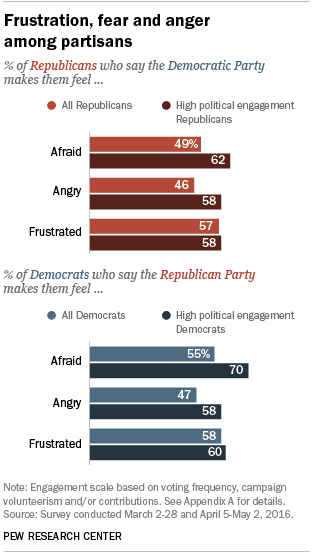Highly negative views of the opposing party – and its members
The 2016 campaign is unfolding against a backdrop of intense partisan division and animosity. Partisans’ views of the opposing party are now more negative than at any point in nearly a quarter of a century.
For the first time in surveys dating to 1992, majorities in both parties express not just unfavorable but very unfavorable views of the other party. And today, sizable shares of both Democrats and Republicans say the other party stirs feelings of not just frustration, but fear and anger.
More than half of Democrats (55%) say the Republican Party makes them “afraid,” while 49% of Republicans say the same about the Democratic Party. Among those highly engaged in politics – those who say they vote regularly and either volunteer for or donate to campaigns – fully 70% of Democrats and 62% of Republicans say they are afraid of the other party.
Congress at 100 Days:Frenetic Action at the Capitol, but Few Accomplishments
In the Senate, legislators have appeared to stop trying. Important cabinet appointments, a Supreme Court confirmation and a vast array of deregulation measures have all been passed without the 60-vote requirement that was once customary. Driven at once by haste and partisanship, Congress has been hampered from moving forward on the tax code, infrastructure and the health care law.
In the House, not even a healthy Republican majority has proved enough. On Thursday, House Republican leaders again failed to round up enough votes among their own members, leaving some in the party politically exposed in the process. A beloved House tax proposal appears to have been jettisoned by the Trump administration before it could even get going.
The net result is the appearance of frenetic action, and the reality is few accomplishments.
Senate committees, largely hamstrung by divisive fights over cabinet nominees, have barely moved forward with any bills. Most measures that have passed have done so through an obscure rule that allows Congress to overturn prior presidential orders, passing with little scrutiny and minimal support. The broad policy agenda that Republicans bragged would be forthcoming if they could only win control in Washington has eluded them.
“The only honest answer is that the election has made it difficult in the committees,” said Senator Lamar Alexander, Republican of Tennessee, who longs for bipartisan solutions to at least some of the flaws in the health care law.





